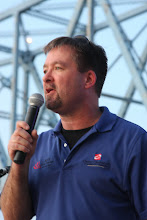 There we were last Friday, in far west Kentucky, Hickman County at Columbus-Belmont State Park, another of Kentucky's great treasures. Sitting in front of a crowd of about 30 people were Kentucky Transportation Secretary Mike Hancock (at podium) and Indiana Department of Transportation Commissioner Michael B. Cline (second from left) as well as the I-69 project managers for both states, Ted Merryman from Kentucky and Sam Sarvis from Indiana. They had come at the invitation of the West Kentucky Chamber Regional Chamber Alliance (WKRCA), and many of us were in awe.
There we were last Friday, in far west Kentucky, Hickman County at Columbus-Belmont State Park, another of Kentucky's great treasures. Sitting in front of a crowd of about 30 people were Kentucky Transportation Secretary Mike Hancock (at podium) and Indiana Department of Transportation Commissioner Michael B. Cline (second from left) as well as the I-69 project managers for both states, Ted Merryman from Kentucky and Sam Sarvis from Indiana. They had come at the invitation of the West Kentucky Chamber Regional Chamber Alliance (WKRCA), and many of us were in awe.I and a few others couldn't help but think back to early 2008 when we'd made our first trip to Frankfort to talk about I-69. Transportation officials there were nice but also a long way from any commitments for the project. Due to a lack of funding, the thought of seeing the 156 miles of I-69 through the Commonwealth making much progress in the near future seemed remote at best. We didn't give up.
Working through the 12 chambers of commerce in Chamber Leadership Initiatives for Northwestern Kentucky (C-LINK) and later the 14 chambers that comprise WKRCA, we continued to beat the drum for I-69. Two years later, Kentucky has an I-69 project manager, 800 people attended an I-69 rally disguised as "West Kentucky Night" during the legislative session, there's $51 million of projects in the state road plan for I-69, and now we await the results of Kentucky's application for a special grants program through the U.S. DOT to upgrade 70 miles of Kentucky parkways to become a big part of I-69.
Last Friday, Secretary Hancock was asked what the chambers should do. "Continue your united front, advocate together," was his only answer. Twenty-six chambers of commerce representing 6,500+ business members are marching to the same beat and getting the attention of those who make the decisions. Good things happen when people work together.



